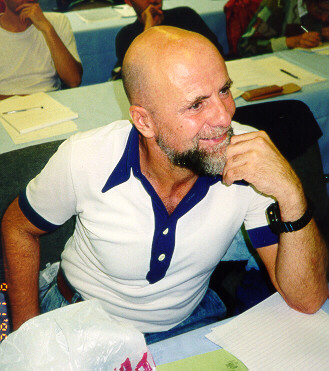
Universal algebraic logic, new perspectives in the Tarskian school
Istvan Nemeti and Andras Simon
Alfréd Rényi Institute of Mathematics, Budapest, Hungary
What is logic? What is a logic? (Two different questions, cf. [1],[2] for answers.) Why algebraize? Algebraization of logics as a method for putting all kinds of logics into a unifying, mathematically streamlined perspective [3],[4]. Duality theory between the world of logics and the world of (classes of) algebras. Characterization of domains of validity of fundamental theorems of logic, like interpolation (Craig), definability (Beth), deduction, compactness,..., undecidability. The approach of Tarski’s school (still active, presently expanding) to these and related issues [5],[6]. Algebraizing the semantic/model theoretic aspects leads to algebras of sets of sequences, i.e. of relations. Hence a central unifying tool for all the above is provided by theories of algebras of relations of various ranks: cylindric algebras, polyadic algebras of relations and their variants. Relativization is used as a tool for turning negative results to positive [7],[8]. This leads to positive results for the guarded fragment and bounded fragment of FOL as well as for logics of the dynamic (or arrow) trend, for relational semantics in general, and for making the finite variable hierarchy of FOL behave well. Definitional equivalence of many-sorted first-order theories as a step toward defining equivalence of logics [9]. Broadening the scope of applicability of logic: logic foundation of spacetime theories (two-way connections). Cosmologic. The Godel-Einstein collaboration. The unity of Tarski’s approaches to (i) logic, (ii) universal algebra, (iii) algebraic logic, and (iv) geometry (space-time). Convergence of major schools: Tarski, Quine, van Benthem & Goldblatt.
References:
[1] Andreka-Nemeti-Sain: Algebraic Logic, In: Handbook of Philosophical Logic Vol.2, Kluwer 2002.
[2] Nemeti-Andr´eka: General Algebraic Logic: a perspective on What is logic, In: What is a logical system, Clarendron, 1994.
[3] Andreka: Universal Algebraic Logic, PhD Diss., 1977.
[4] Andreka-Gergely-Nemeti: Universal algebraic construction of logics, Studia Logica 1977.
[5] Henkin-Monk-Tarski: Cylindric Algebras, Chap.5.3, North-Holland 1981, 1985.
[6] Andreka-Madarasz-Nemeti: Algebraic Logic, J. Rel. Methods in Comp.Sci. 2004.
[7] Simon: Nonrepresentable algebras of relations, PhD Diss., 1977.
[8] Andreka-van Benthem-Nemeti: Modal languages and bounded fragments of predicate logic, J. Phil. Logic 1998.
[9] Madarasz: Logic and Relativity, section 4.3, 2002. Many of the above works are available here